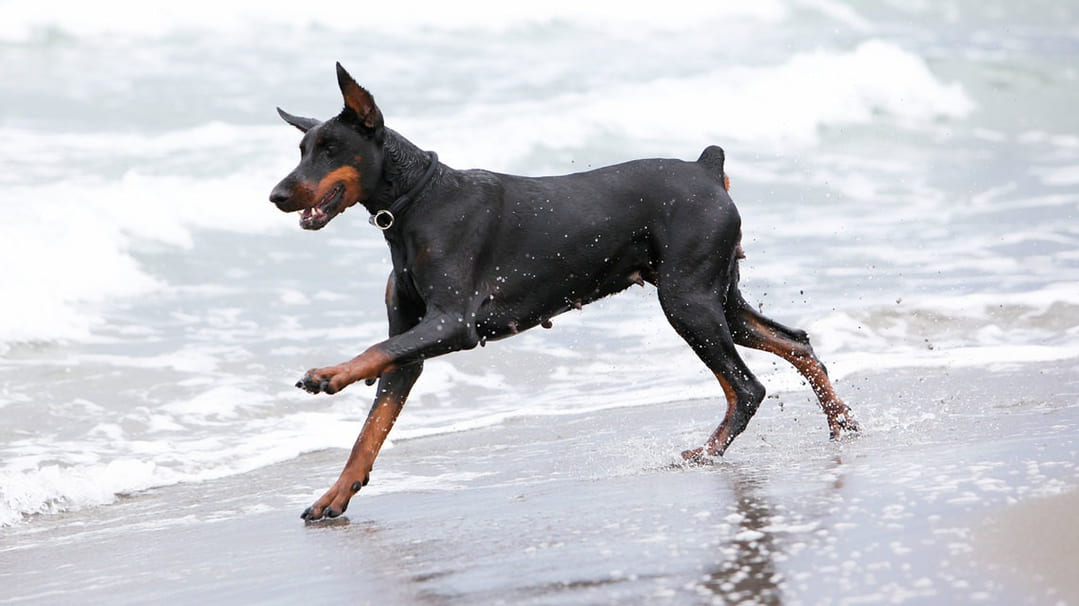🐶
Doberman Pinscher
Dogs Breed
large
Size
10
Years Life Expectancy
1
Years to Maturity

About Doberman Pinscher
The Doberman Pinscher is a large working breed originally developed for guardian. Weighing 30-40 kg and standing 61-71 cm at the shoulder, and typical lifespan 10-10 years (average about 10). Temperament: Fearless, Energetic and Alert. Health considerations: Monitor hips; consider early screening (OFA/PennHIP).
Detailed Overview
Overview: The Doberman Pinscher is a large working breed originally developed for guardian. This overview synthesizes structured characteristics (size, temperament, lifespan) into a practical ownership profile without relying on external narrative sources.
Physical & Growth: Typical adult weight 30-40 kg and height 61-71 cm at the shoulder. Growth plates generally approach closure near the maturity age (~1.4 yrs), after which sustained conditioning and joint-friendly exercise patterns are emphasized. Senior life stage typically begins around 7 yrs, prompting adjustments in caloric density, joint monitoring, and wellness screening intervals.
Temperament & Trainability: Temperament commonly described as fearless, energetic, alert, loyal, obedient and confident when appropriately socialized. Consistent early social exposure, reward-based reinforcement, and structured boundaries help channel instinctive drives productively. Short, focused sessions reinforce responsiveness while reducing overstimulation.
Exercise & Enrichment: Recommended baseline is 90-135 minutes of varied activity. Blend aerobic activity (walks, controlled fetch, swimming where appropriate) with cognitive tasks (target training, scent games, puzzle feeders). Periodic rest intervals and surface diversity (grass, stable footing) support musculoskeletal resilience.
Health & Preventive Care: Lifespan 10-10 years (avg ~10). Commonly monitored health areas may include hipdysplasia. Preventive strategies emphasize early detection, maintaining ideal body condition, and minimizing avoidable strain. Maintaining a lean body condition score and monitoring subtle gait changes or behavioral shifts allows earlier veterinary consultation. Dental hygiene (brushing or validated chews) and parasite prevention further support longevity.
Household Suitability: Best for homes with space and owners committed to regular structured exercise. High energy means owners should plan training games, scent or task work, and rotation of enrichment objects to reduce boredom-driven behaviors. Thoughtful scheduling of training, exercise, rest, and calm handling routines helps sustain behavioral stability. Equipment basics include a properly fitted flat collar or harness, enrichment rotation (chew variety, scent articles), and an appropriately sized resting area that balances joint support with temperature regulation.
Care Summary: Integrating measured physical exercise, progressive training progression, nutritional portion control, and proactive wellness screening forms a comprehensive stewardship model for the Doberman Pinscher. Adjust protocols responsively across life stages—from juvenile learning windows through senior comfort adaptations—to optimize wellbeing.
Physical & Growth: Typical adult weight 30-40 kg and height 61-71 cm at the shoulder. Growth plates generally approach closure near the maturity age (~1.4 yrs), after which sustained conditioning and joint-friendly exercise patterns are emphasized. Senior life stage typically begins around 7 yrs, prompting adjustments in caloric density, joint monitoring, and wellness screening intervals.
Temperament & Trainability: Temperament commonly described as fearless, energetic, alert, loyal, obedient and confident when appropriately socialized. Consistent early social exposure, reward-based reinforcement, and structured boundaries help channel instinctive drives productively. Short, focused sessions reinforce responsiveness while reducing overstimulation.
Exercise & Enrichment: Recommended baseline is 90-135 minutes of varied activity. Blend aerobic activity (walks, controlled fetch, swimming where appropriate) with cognitive tasks (target training, scent games, puzzle feeders). Periodic rest intervals and surface diversity (grass, stable footing) support musculoskeletal resilience.
Health & Preventive Care: Lifespan 10-10 years (avg ~10). Commonly monitored health areas may include hipdysplasia. Preventive strategies emphasize early detection, maintaining ideal body condition, and minimizing avoidable strain. Maintaining a lean body condition score and monitoring subtle gait changes or behavioral shifts allows earlier veterinary consultation. Dental hygiene (brushing or validated chews) and parasite prevention further support longevity.
Household Suitability: Best for homes with space and owners committed to regular structured exercise. High energy means owners should plan training games, scent or task work, and rotation of enrichment objects to reduce boredom-driven behaviors. Thoughtful scheduling of training, exercise, rest, and calm handling routines helps sustain behavioral stability. Equipment basics include a properly fitted flat collar or harness, enrichment rotation (chew variety, scent articles), and an appropriately sized resting area that balances joint support with temperature regulation.
Care Summary: Integrating measured physical exercise, progressive training progression, nutritional portion control, and proactive wellness screening forms a comprehensive stewardship model for the Doberman Pinscher. Adjust protocols responsively across life stages—from juvenile learning windows through senior comfort adaptations—to optimize wellbeing.
Temperament
FearlessEnergeticAlertLoyalObedientConfidentIntelligent
Health Considerations
🦴
Hip Dysplasia Risk
Monitor joint health
Health Care Recommendations
- 💡Monitor hips; consider early screening (OFA/PennHIP).
Quick Facts
Category:Dogs
Size:large
Weight:30 - 40 kg
Height:61 - 71 cm
Life Span:10 years
Maturity:1 years
Senior Age:7 years
Additional Information
citations json:N/A
lifespan range:10-10
reference image id:HyL3bl94Q
source schema version:5
training end age months:25
training start age months:2